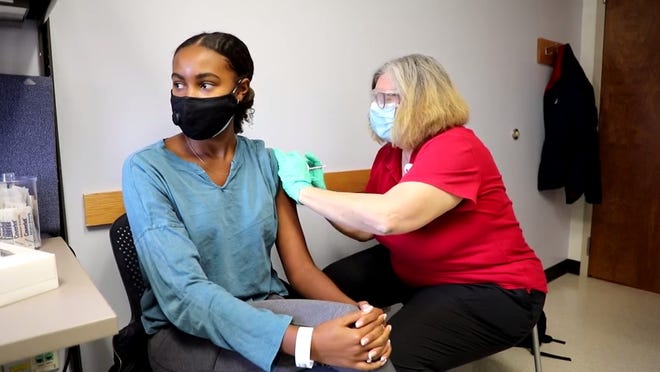
Melanie, 16, a Walnut Hills High School student, is passionate about stepping forward for a COVID-19 vaccine trial for adolescents.
Melanie signed up and was selected for a trial at Cincinnati Children's Hospital Medical Center in November, and she got her two vaccines that month.
“Was I scared?” she said. “No.”
The girl and Cincinnati Children's pediatric experts and vaccine experts spoke to U.S. Sens. Rob Portman and Sherrod Brown in a virtual congressional briefing Friday morning, advocating for children to get COVID-19 vaccines, for everyone's safety. Her last name wasn't provided by those organizing the hearing.
Gov. Mike DeWine to schools: Return to classes by March 1 or forgo COVID-19 vaccines
COVID-19 has hit adults, especially elderly people and people with compounding health conditions, hardest. But children are also victims of the novel coronavirus pandemic, said Dr. Robert Frenck, who is leading adult and child vaccine studies at Cincinnati Children's.
He pointed to these facts, shared by the American Academy of Pediatrics as of Jan. 28:
- 2.8 million children have had COVID-19. (As of Feb. 4, the number was 2.93 million.)
- More than 12,000 children have been hospitalized with COVID-19.
- More than 210 children have died from COVID-19.
- Almost 25% of the United States population is under 18.
"The infection rate in children is now equivalent to the infection rate in adults," said Frenck, director of the National Institutes of Health-funded Vaccine and Treatment Evaluation Unit and Gamble Program for Clinical Studies at Cincinnati Children's. "If you only vaccinate adults it won't be sufficient."
Frenck started the Pfizer trial for teens in October.
Melanie, who is Black, said that, by participating, she's helping move the vaccine forward for all kids and for women of color, but she's also helping her own school friends understand that the COVID-19 vaccine is safe.
“It’s crucial that we feel safe and comfortable," she said. “Cincinnati Children’s has made the experience safe and comfortable.”
Her only side effect was a sore arm for a bit, she said.

"Most of my friends were pretty supportive. I did have a few comments ... of people that didn't trust the vaccine," Melanie said.
The issue of trust is important for everyone, and particularly for people of color, the Cincinnati Children's medical experts who participated in the hearing said, noting a disparity in Black Americans and Latino Americans who've received the vaccines so far.
Frenck said the vaccine trials have been condensed because of the urgency of pandemic, but he added, "There weren't corners cut. A lot of it was because of resources our government provided. It was just this sort of telescoping down."
He also said the vaccine efficacy of 94% – or its maximum effectiveness –was greater than expected. "It is a huge success."
Ohio COVID-19 death error: State epidemiologist reassigned, employee involved in count resigns
Frenck said he foresees vaccines for kids 12 and older possibly approved before the next school year and within a year for younger children, though currently, younger children are not yet enrolled in vaccine trials.
That's a conservative estimate, compared to what Dr. Anthony Fauci told the online newsroom ProPublica in an interview on Thursday. Children as young as "first-graders may be able to get the coronavirus vaccine by the time school starts" in September, presuming trials are successful in those age groups, said Fauci, director of the National Institute of Allergy and Infectious Diseases as well as President Joe Biden's chief scientific advisor on COVID-19.
Coronavirus casualties: Hamilton County Sheriff's deputy dies of COVID-19 complications
Cincinnati Children's Chief Medical Officer Dr. Tina Cheng said the novel coronavirus pandemic has affected children negatively physically, socially and emotionally. She pointed to the drop in routine vaccines, to the increase in child abuse calls, the absence from in-person schooling, the late arrival at emergency rooms of children who should've been seen before a medical crisis, the drop in socializing and more issues.
Melanie said she sees the impact of COVID-19 and the concerns about the vaccine itself among kids firsthand.
"Some teenagers have become depressed. Teenagers don't know who to turn to," she said.
"Adults are getting the vaccine," Melanie said. "Children and teens are also at risk of getting COVID-19. People of color and children should be included."
Source link







